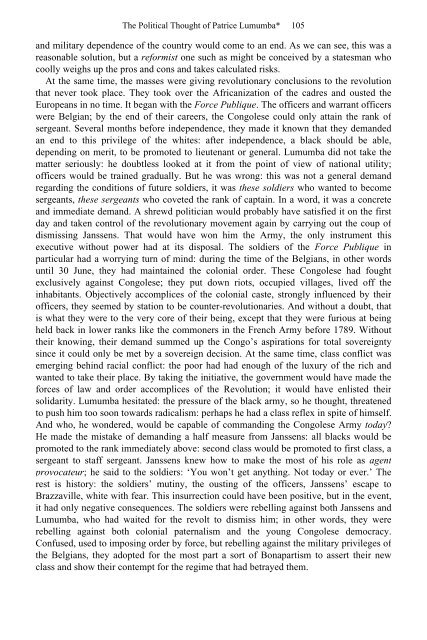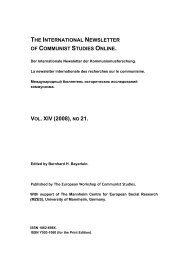11RXNdQ
11RXNdQ
11RXNdQ
Create successful ePaper yourself
Turn your PDF publications into a flip-book with our unique Google optimized e-Paper software.
The Political Thought of Patrice Lumumba* 105<br />
and military dependence of the country would come to an end. As we can see, this was a<br />
reasonable solution, but a reformist one such as might be conceived by a statesman who<br />
coolly weighs up the pros and cons and takes calculated risks.<br />
At the same time, the masses were giving revolutionary conclusions to the revolution<br />
that never took place. They took over the Africanization of the cadres and ousted the<br />
Europeans in no time. It began with the Force Publique. The officers and warrant officers<br />
were Belgian; by the end of their careers, the Congolese could only attain the rank of<br />
sergeant. Several months before independence, they made it known that they demanded<br />
an end to this privilege of the whites: after independence, a black should be able,<br />
depending on merit, to be promoted to lieutenant or general. Lumumba did not take the<br />
matter seriously: he doubtless looked at it from the point of view of national utility;<br />
officers would be trained gradually. But he was wrong: this was not a general demand<br />
regarding the conditions of future soldiers, it was these soldiers who wanted to become<br />
sergeants, these sergeants who coveted the rank of captain. In a word, it was a concrete<br />
and immediate demand. A shrewd politician would probably have satisfied it on the first<br />
day and taken control of the revolutionary movement again by carrying out the coup of<br />
dismissing Janssens. That would have won him the Army, the only instrument this<br />
executive without power had at its disposal. The soldiers of the Force Publique in<br />
particular had a worrying turn of mind: during the time of the Belgians, in other words<br />
until 30 June, they had maintained the colonial order. These Congolese had fought<br />
exclusively against Congolese; they put down riots, occupied villages, lived off the<br />
inhabitants. Objectively accomplices of the colonial caste, strongly influenced by their<br />
officers, they seemed by station to be counter-revolutionaries. And without a doubt, that<br />
is what they were to the very core of their being, except that they were furious at being<br />
held back in lower ranks like the commoners in the French Army before 1789. Without<br />
their knowing, their demand summed up the Congo’s aspirations for total sovereignty<br />
since it could only be met by a sovereign decision. At the same time, class conflict was<br />
emerging behind racial conflict: the poor had had enough of the luxury of the rich and<br />
wanted to take their place. By taking the initiative, the government would have made the<br />
forces of law and order accomplices of the Revolution; it would have enlisted their<br />
solidarity. Lumumba hesitated: the pressure of the black army, so he thought, threatened<br />
to push him too soon towards radicalism: perhaps he had a class reflex in spite of himself.<br />
And who, he wondered, would be capable of commanding the Congolese Army today?<br />
He made the mistake of demanding a half measure from Janssens: all blacks would be<br />
promoted to the rank immediately above: second class would be promoted to first class, a<br />
sergeant to staff sergeant. Janssens knew how to make the most of his role as agent<br />
provocateur; he said to the soldiers: ‘You won’t get anything. Not today or ever.’ The<br />
rest is history: the soldiers’ mutiny, the ousting of the officers, Janssens’ escape to<br />
Brazzaville, white with fear. This insurrection could have been positive, but in the event,<br />
it had only negative consequences. The soldiers were rebelling against both Janssens and<br />
Lumumba, who had waited for the revolt to dismiss him; in other words, they were<br />
rebelling against both colonial paternalism and the young Congolese democracy.<br />
Confused, used to imposing order by force, but rebelling against the military privileges of<br />
the Belgians, they adopted for the most part a sort of Bonapartism to assert their new<br />
class and show their contempt for the regime that had betrayed them.




